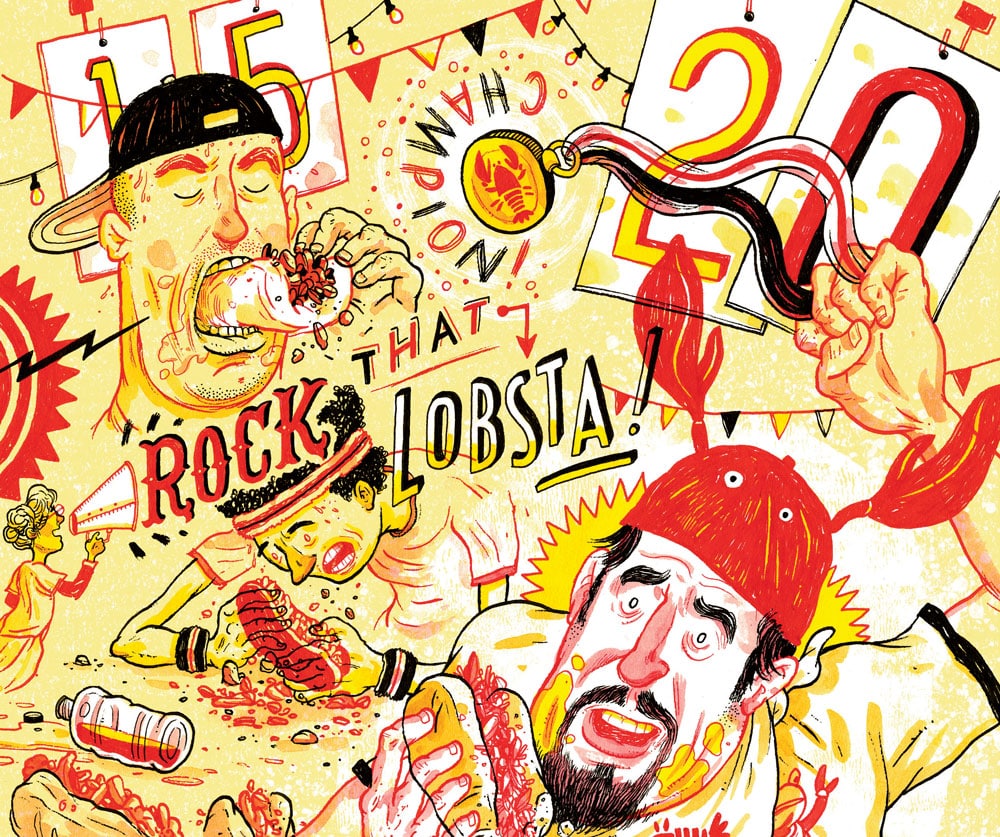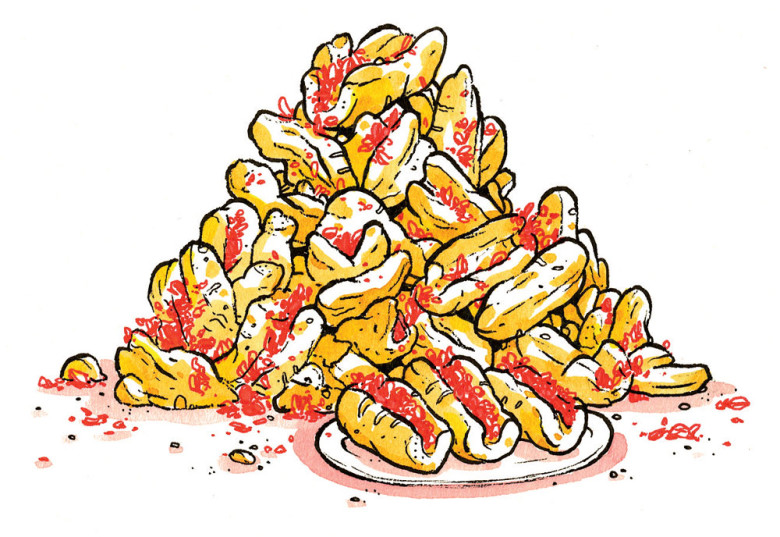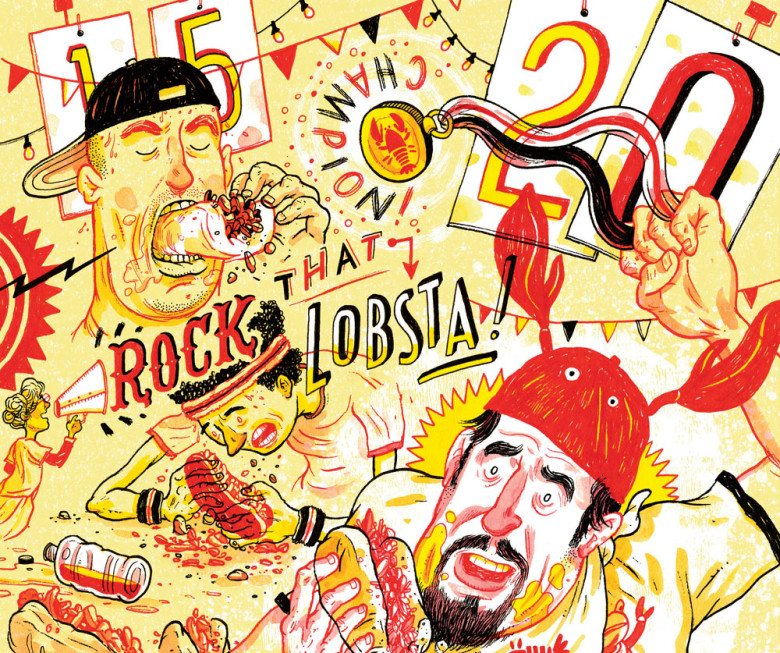Feeding Frenzy | Competitive Lobster Roll Eating
His opponents vanquished, the champion drapes his newly won title belt over his broad shoulders and raises his arms, basking in the cheers of the small but enthusiastic crowd. At a little over 6 feet tall and hovering around 300 pounds, this powerfully built man, who turned 47 just a week earlier, could pass for […]

Feeding Frenzy | A Closer Look at Competitive Lobster Roll Eating
Photo Credit : John HendrixHis opponents vanquished, the champion drapes his newly won title belt over his broad shoulders and raises his arms, basking in the cheers of the small but enthusiastic crowd.
At a little over 6 feet tall and hovering around 300 pounds, this powerfully built man, who turned 47 just a week earlier, could pass for a professional wrestler. Instead of a crowded arena, however, we are gathered on a beautiful beach on a somewhat overcast day. And the champ has won without laying a hand on his opponents—although a mountain of lobster rolls clearly has had a very rough day. —
—
Fifteen minutes earlier, this is the scene: Eleven contestants gather on the Hampton Beach Seashell Stage, having earned their right to gorge on lobster rolls thanks to a qualifying competition (hot dog eating) held the previous month. James Burgess, who last year vanquished 12 lobster rolls in 10 minutes, is back. A petite blond woman named Cassie stands out among the otherwise all-male lineup; she is there representing the bank she works for, which is also the event’s primary sponsor. A local competitor named Mike has the most enthusiastic cheering section, and they hoot and holler, holding up signs that say “Rock That Lobsta” and “Mike’s Crew: This Is How We Roll.”
At the left side of the stage and largely ignored by the crowd, two competitors are carefully arranging their places at the long table, checking their water cups, and pushing extra chairs out of their way.
The first trays of 3½-ounce lobster rolls are brought out.
The official counters take their places, standing on chairs behind each contestant.
The crowd counts down to the starting signal, and they’re off. Within 30 seconds, though, everyone’s eyes are drawn toward the left side of the stage.
—
The eating contest has a long history at county fairs, where local legends have been born during pie eating competitions that inevitably ended in laughter. But competitive eating took on the weight of an actual sport in the early 1970s, when a stroke of PR genius led to the inaugural Nathan’s Famous Fourth of July Hot Dog Eating Contest on Coney Island. Thirty years later, a phenom from Japan named Takeru Kobayashi took the world of competitive eating by storm. A few years after that, a young American named Joey Chestnut knocked Kobayashi off his perch, launching a rivalry that made the hot dog eating contest a top attraction on ESPN and spawned a bevy of imitators.
Today, there are two major leagues of competitive eating, each with its own guidelines. At All Pro Eating events, “picnic style” rules mandate that the food be eaten whole—no dunking in water. The organization touts this as paying “respect” to the food and maintaining the food’s “integrity,” “dignity,” and “public reputation.” The rival International Federation of Competitive Eating, however, allows eaters to disassemble and dunk, within certain limits. Depending on the event, food that is “chipmunked” (stuffed into the mouth but not yet swallowed) may or may not count toward the final tally. Excessive food debris left on the table typically counts against a competitor. And, well, “losing” it all, either during or after the competition, is grounds for disqualification.
—
“Gentleman” Joe Menchetti, a ticket broker from Connecticut, has more than 100 wins on his résumé. He eats fast. In previous events, he stuffed down 70 dumplings in two minutes and devoured 5½ pounds of macaroni and cheese in six minutes. Forty-two cupcakes? Eight minutes. Twenty-eight tacos? Five minutes. Twenty-six clam cakes? 10 minutes. Seventy-seven pieces of sushi? Five minutes. Seventy-five chicken wings? Eight minutes. The list goes on.
But on this day, Menchetti has a serious challenger. Beside him on the Seashell Stage is Teddy Delacruz, who has traveled from Illinois with an appetite for lobster rolls. Lots of lobster rolls.
Falling into a stuff-chew-swallow-drink rhythm, Menchetti takes an early lead. Delacruz keeps pace just behind him. The others fall further and further behind, a situation exacerbated by their own growing interest in the spectacle unfolding at stage right.
In the final moments, Menchetti is maintaining his lead but Delacruz is right behind him, seemingly drafting like a NASCAR driver, aiming for a finish-line sprint.
Then, controversy: Menchetti finishes his 22nd roll and motions for more; Delacruz is gesturing, too. Where are the rolls? Confused, event organizers scurry to confirm that, yes, the impossible has happened. The gluttonous field has so outpaced the totals from previous years that the entire supply is gone.
Usually the crowd counts down the last seconds as competitors swallow urgently. But here, it all ends with good-natured shrugs. With 22 rolls downed in slightly less than 10 minutes, Menchetti takes top honors and $600. (Impressed? A decade ago, Kobayashi set a world record in Boston by ingesting 41 lobster rolls in about the same amount of time.) Delacruz, stalled at 21, must settle for second place and $250. In third place is Burgess, who will take home $150 for eating 12.
As Menchetti slowly and deliberately walks off the stage, I ask him how he feels.
He pauses for just a moment, as if still swallowing, then answers with a single word.
“Full.”
This year’s Hampton Beach Seafood Festival will be held September 8–10. For more information, go to hamptonbeachseafoodfestival.com.
Joe Bills
Associate Editor Joe Bills is Yankee’s fact-checker, query reader and the writer of several recurring departments. When he is not at Yankee, he is the co-owner of Escape Hatch Books in Jaffrey, NH.
More by Joe Bills


